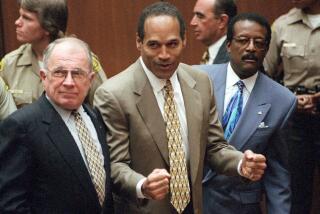Deal Being Crafted to Settle Fight Over Heiress’ Estate
- Share via
NEW YORK — Lawyers in the bitter fight over the $1.2-billion estate of Doris Duke met Thursday in Manhattan Surrogate’s Court to work out a settlement that could finally send the tobacco heiress’ money to charity more than two years after her death.
While no final agreement was reached during the closed-door meetings before Surrogate Judge Eve M. Preminger, attorneys in the case said they were negotiating details of a deal under which Duke’s former butler, Bernard Lafferty, would step aside as co-executor of the estate but still play a role in the charity created by Duke’s last will.
Also slated to get a place on the board of the Doris Duke Charitable Foundation is Dr. Harry B. Demopoulos, a New York physician who has led the legal challenge to the 1993 will signed by Duke in a Los Angeles hospital bed. Another member would be a Newport, R.I., society friend of Duke, Marian Oates Charles, with two other trustees to be determined.
The settlement talks were pushed by the New York state attorney general’s office after a ruling by the state’s highest court that Preminger had improperly removed Lafferty as executor. Preminger had removed Lafferty after hearing allegations that the butler went on spending sprees and drinking binges.
Under the heiress’ 1993 will, Lafferty was to receive $500,000 a year plus $5 million in executors’ fees and have the power to appoint the five-member board of the charitable foundation.
Under the tentative settlement, the 50-year-old Lafferty would step down as co-executor, but the bank he brought in to help manage the estate, United States Trust Co. of New York, would remain a co-executor along with an individual still to be named.
Attorneys for Demopoulos said they would not object to the former butler having some position in the Duke foundation.
But “it cannot be a Lafferty-controlled thing,” said Don Howarth, a Los Angeles lawyer for the physician, who once was in line to be Duke’s executor under a 1991 codicil. “Basically there were two critical things: that Lafferty not control [the board] and that Dr. Demopoulos should have a significant role.”
Lafferty would not comment Thursday, but he said recently that he was anxious “to get the money to the charities,” and might agree to a reduced position--as long as he had some role in the foundation.
One unresolved issue is the size of “surcharges” that may be owed the estate by Lafferty or U.S. Trust because of alleged mismanagement. One lawyer at the meetings said a huge range was mentioned--from $500,000 to $18 million--but that the bank may pay whatever Lafferty owes.
“There is no settlement [yet],” New York Deputy Atty. Gen. John H. Carley said as he left court.
A roadblock could be financial giant Chemical Bank of New York, which was in line to manage Duke’s fortune until she moved her money to U.S. Trust months before her death in October 1993.
After the meetings ended Thursday, Chemical obtained a court order setting a hearing next week to determine if it should have standing to challenge Duke’s last will and any settlement that freezes it out of the lucrative job.
Lawyers for the bank charged that Duke was medicated and suffering from “cognitive impairment” when she changed banks.
“It now seems clear that the firing of Chemical was likely to have been part of Mr. Lafferty’s orchestrated efforts, as assisted by [Duke’s attorneys] to completely take over Miss Duke’s affairs,” the bank charged. “Chemical Bank, as well as Miss Duke herself, was duped by this scheme.”
Also ready to object is Raymond J. Dowd, the lawyer for three former Duke servants who have leveled a series of highly publicized charges since her death, at 80, in her home above Beverly Hills. They reportedly are being denied any monetary settlement from the estate.
More to Read
Sign up for Essential California
The most important California stories and recommendations in your inbox every morning.
You may occasionally receive promotional content from the Los Angeles Times.













